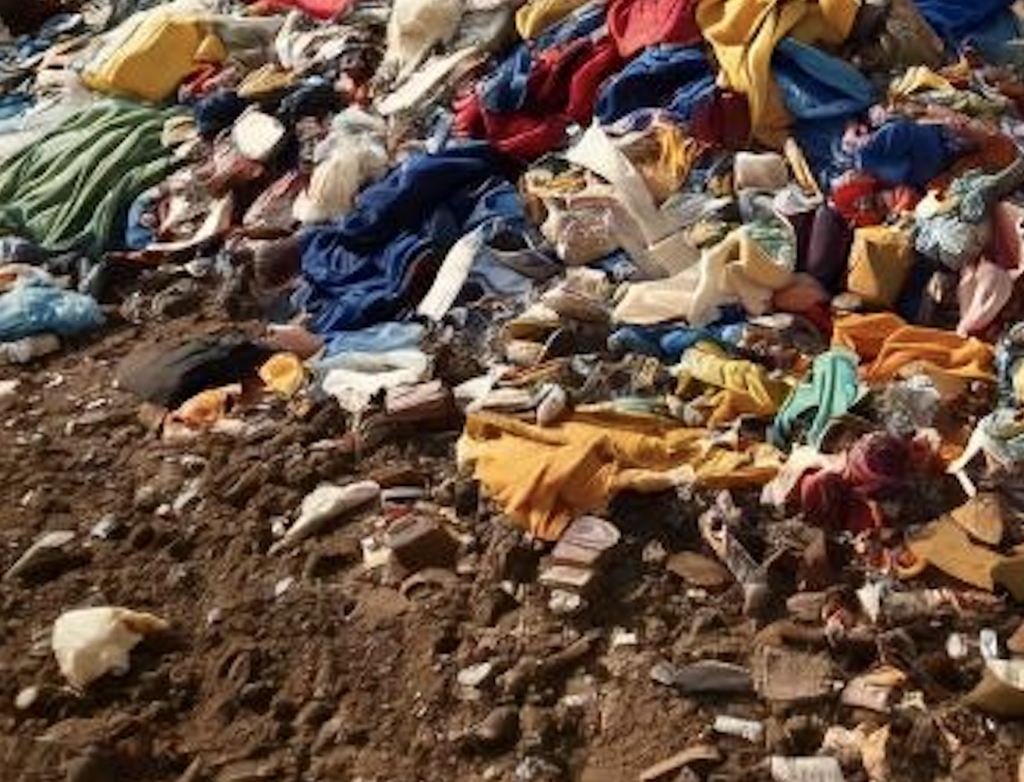
With Halloween around the corner, we have a frightening topic to bring to our readers. That is, the scary truth about every everyone’s favourite “fashion” brand: Shein.
A recent article from Grist has highlighted Shein’s troubling rise as the world’s biggest fast-fashion polluter, a distinction it has earned through relentless production practices that push waste and environmental degradation to new heights. The appeal of Shein’s ultra-cheap yet stylish clothing obscures the massive environmental toll it emits. With garments made mostly from synthetic materials like polyester (basically plastic), Shein fuels a steady stream of microplastics and greenhouse gas emissions (GHGs) into the environment challenging global sustainability efforts. We in ZWAI have long advocated against fast fashion brands like Shein, with blog articles such as this one and in our submissions to Irish government and the EU Commission, such as our Revision of the EU Waste Framework submission from last year.
The Problem with Overproduction and Synthetic Materials
Shein’s business model banks on producing vast quantities of clothing at minimal cost, targeting consumers who seek affordable fashion with little regard for long-term durability. This approach contributes directly to textile waste; synthetic fabrics used in Shein’s products, while affordable, don’t break down in the environment. Instead, they release harmful microplastics into the oceans and soils, creating an environmental burden that lasts for decades. These microplastics are extremely harmful to aquatic life, and have even been found in human blood samples, with health effects still largely unknown. Shein’s scale of production, combined with disposable trends, means clothing that’s barely worn will end up in landfills or washed into waterways, fueling an unmanageable waste cycle.
AI and how it Accelerates the Problem
How did Shein become the mass polluting giant that it is today? Well, adding to this challenge is Shein’s recent adoption of artificial intelligence. AI-driven technology allows the company to forecast and replicate trending styles at an even faster rate, reducing the time between trend and production to mere days. While AI could theoretically help reduce waste by aligning production with demand, Shein’s use of AI has instead accelerated unsustainable levels of consumption, flooding the market with short-lived fashion items at a breakneck pace. The result? Even more unnecessary waste, as cheaply made garments are discarded as quickly as new trends emerge.
Environmental and Ethical Concerns Go Beyond Clothing
Beyond environmental issues, Shein’s practices raises many ethical questions. The company’s emphasis on quantity over quality leads to an unfeeling disregard not just for the planet but for the workers and communities affected by these production practices. reports such as this one have exposed the reality of the brand for Shein’s workers. Many of these people are forced to work up to 75 hours per week, often in unsafe conditions. how can this be normal, all for the sake of a teenager in the West being able to wear the latest trending dress or pair of jeans?
There’s an inherent irony in a business model that relies on depleting natural resources and sacrificing labour conditions for clothing that rarely lasts a season.
Holding Fast Fashion Accountable
Shein’s profit-over-planet mentality underscores a deep-rooted issue within the fast fashion industry. Their meteoric growth, now bolstered by AI, sends a clear signal: sustainability is not on Shein’s agenda, and the environmental cost is something future generations will have to bear. For consumers, this awareness should serve as a call to action. The appeal of Shein’s low prices pales in comparison to the long-term environmental debt these practices are incurring. With the 2030 UN agenda to reach net-zero, or recent anxiety inducing news like the AMOC reaching breaking point, how can we allow companies like Shein to continue thriving?
Choosing sustainable alternatives and supporting brands committed to ethical production is a step toward combating Shein’s impact. Fast fashion may promise affordable self-expression, but the hidden costs of environmental and ethical harm make this a price far too high.
Want to take further action? Consider joining us as a member! Together, we can have an impact by targeting policy makers and the ones that allow mass consumerism at this scale to take place in the first place.
